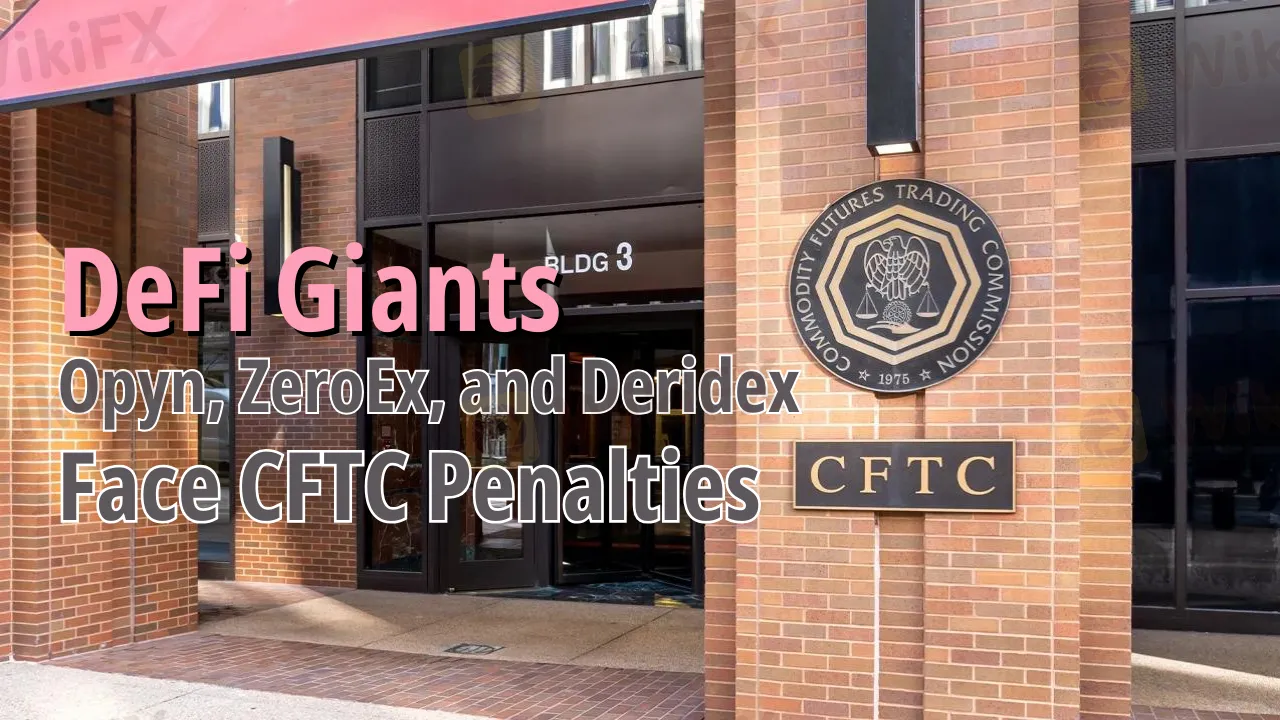简体中文
繁體中文
English
Pусский
日本語
ภาษาไทย
Tiếng Việt
Bahasa Indonesia
Español
हिन्दी
Filippiiniläinen
Français
Deutsch
Português
Türkçe
한국어
العربية
DeFi Giants Opyn, ZeroEx, and Deridex Face CFTC Penalties
Abstract:DeFi leaders Opyn, ZeroEx, and Deridex face CFTC enforcement actions for various violations, highlighting regulatory scrutiny in the decentralized finance realm. Stay informed with the latest in forex through the WikiFX App.

In the ever-evolving world of decentralized finance (DeFi), three major players - Opyn, ZeroEx, and Deridex - have recently been handed enforcement actions by the Commodity Futures Trading Commission (CFTC). These companies have been charged with several violations, emphasizing the CFTC's continuous scrutiny of the DeFi landscape.
The Charges and Penalties
Both Deridex and Opyn are facing penalties for failing to register as a swap execution facility (SEF) or designated contract market (DCM). Furthermore, they were charged for not adopting a customer identification program, which is part of the Bank Secrecy Act compliance program for futures commission merchants (FCMs). ZeroEx, alongside the other two, also faces charges for unlawfully offering leveraged and margined retail commodity transactions in digital assets.

As a consequence, the three firms have been mandated to pay civil monetary penalties. Opyn is set to pay $250,000, ZeroEx will pay $200,000, and Deridex owes $100,000. They are also mandated to halt any violations of the Commodity Exchange Act (CEA) and CFTC regulations.
Deep Dive: The Companies and Their Operations
Opyn, Inc. had launched the Opyn Protocol which facilitated the trading of a digital asset derivative token called oSQTH. This token's value was pegged to an index (Squeeth) that tracked the square of ether's price relative to the USDC stablecoin. The issue arose when it was determined that these tokens acted as swaps and leveraged retail commodity transactions. The CFTC stated that such transactions can only be presented to retail users through a registered exchange. Opyn also did not sufficiently block U.S. users from accessing its protocol.

Deridex, Inc. operated a blockchain-based protocol offering “perpetual contracts.” These contracts can be termed as swaps and, similar to Opyn's issue, must only be offered on a registered exchange. Deridex also took no precautions to exclude U.S. citizens from accessing its protocol.

ZeroEx Inc. on the other hand, introduced a protocol and a front-end application (Matcha) that allowed users to trade digital assets on multiple blockchains. Some of these digital assets provided traders with approximately 2:1 leveraged exposure to renowned digital assets like ether and bitcoin. This was in direct violation of CFTC regulations.

Bright Side of Cooperation
Despite the hefty penalties, the CFTC acknowledged the cooperation extended by all three companies during the Division of Enforcement's investigation. This proactive stance from the firms resulted in a reduction of their respective civil monetary penalties.
For those keen on staying updated with the latest happenings in the forex market, consider installing the WikiFX App. With the DeFi landscape continuously evolving, it's essential to remain informed, ensuring that both investments and operations align with regulatory requirements.
Download the App here: https://www.wikifx.com/en/download.html

Disclaimer:
The views in this article only represent the author's personal views, and do not constitute investment advice on this platform. This platform does not guarantee the accuracy, completeness and timeliness of the information in the article, and will not be liable for any loss caused by the use of or reliance on the information in the article.
Read more

Coinbase Under Scrutiny Amid Wrapped Bitcoin Delisting Controversy
Coinbase has come under fire after announcing its decision to delist Wrapped Bitcoin (wBTC), a move critics claim could be driven by competitive interests. The delisting, set to take effect on 19 December, has sparked allegations of market manipulation and concerns about fairness in the cryptocurrency ecosystem.

Solana Soars to All-Time High, Hits $264 on Coinbase
Solana hits $264 on Coinbase, breaking its 3-year high with an 11% daily surge. Learn what’s driving SOL's meteoric rise and the crypto market rally.

Mastercard Partners with JPMorgan for B2B Cross-Border Payments
Mastercard and JPMorgan's Kinexys Digital Payments join forces to enhance B2B cross-border payments, promising faster settlements and greater transparency.

Bitcoin Nears $100,000: A Triumph of Optimism or a Warning Sign?
Bitcoin’s meteoric rise continues to capture global attention as its price recently surpassed the $99,000 mark, briefly approaching the $100,000 milestone. This unprecedented rally has led market sentiment to reach a state of “extreme greed,” according to the Fear and Greed Index. Analysts suggest that the market may be entering overheated territory, raising questions about sustainability amidst ongoing enthusiasm.
WikiFX Broker
Latest News
Hackers Charged for $11M Crypto Theft Using SIM-Swaps
Role of Central Banks in the FX Market
FCA Alerts Against Sydney FX
What Makes Cross-Border Payments Easier Than Ever?
Trader Exposes Unethical Practices by STP Trading
Malaysian Man Loses RM113,000 in Foreign Currency Investment Scam
Bitcoin Nears $100,000: A Triumph of Optimism or a Warning Sign?
Mastercard Partners with JPMorgan for B2B Cross-Border Payments
FCA Identifies Clone Firm Exploiting Admiral Markets' Credibility
Coinbase Under Scrutiny Amid Wrapped Bitcoin Delisting Controversy
Currency Calculator


